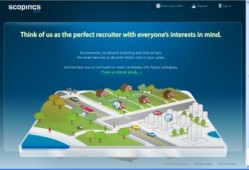There’s a new recruitment site where a candidate doesn’t need a resume, doesn’t need to say who they are, doesn’t even have to go looking for the job.
Some companies have made hires that way for years. It’s just that those “special” candidates are the boss’s relatives. For the rest of the world, the new site is an experiment in anonymous sourcing. It’s called Scopings and it sort of reminds us of those old computer dating programs. Candidates put in a little bit of information about themselves; employers put in a little more information.

The computer compares the candidates to the job description and suggests possible matches. Then the courting begins.
Only when both of you show enough signs of interest is the cloak of anonymity dropped.
That’s the essence of the site. As might be expected it has bells and whistles to manage the courtship, including the ability to create “rounds,” which are elimination questions. These rounds of questions can be done online or by phone. The downside to the latter is that you have to listen to a bunch of voicemails. The plus is that you get a taste of a candidate’s communication skills without an interview.
Scopings is both a site and a service. Candidates can stumble upon Scopings to register and set up a scope, creating a database that will be owned by Novologies LLC, the Brooklyn company behind the site. (For the moment, Scopings is offering jobs only in the San Francisco Bay Area, New York City, and Boston.)
Or employers can engage Scopings to handle one or more reqs. In that case, Scopings becomes the candidate entry point for applying, anonymously of course, and let the matching begin.
What we like about the concept is that a candidate who is not actively looking, but may be receptive, can ask the recruiter or hiring manager enough questions about the job and the company culture to know if it is something worth pursuing. That works the other way around, too.
In practice, we wonder how many recruiters will take the time to provide anything but stock answers. It’s seems unlikely that a hiring manager would engage in a Q and A with prospects whose identities (and complete CV) they don’t know. Even today, when every run-of-the mill ATS system has the ability to acknowledge receipt of an application, candidates complain of the recruitment black hole. So expecting a recruiter to respond thoughtfully with a personal note to anonymous candidates has as much chance of happening as a politician making good on their promises.